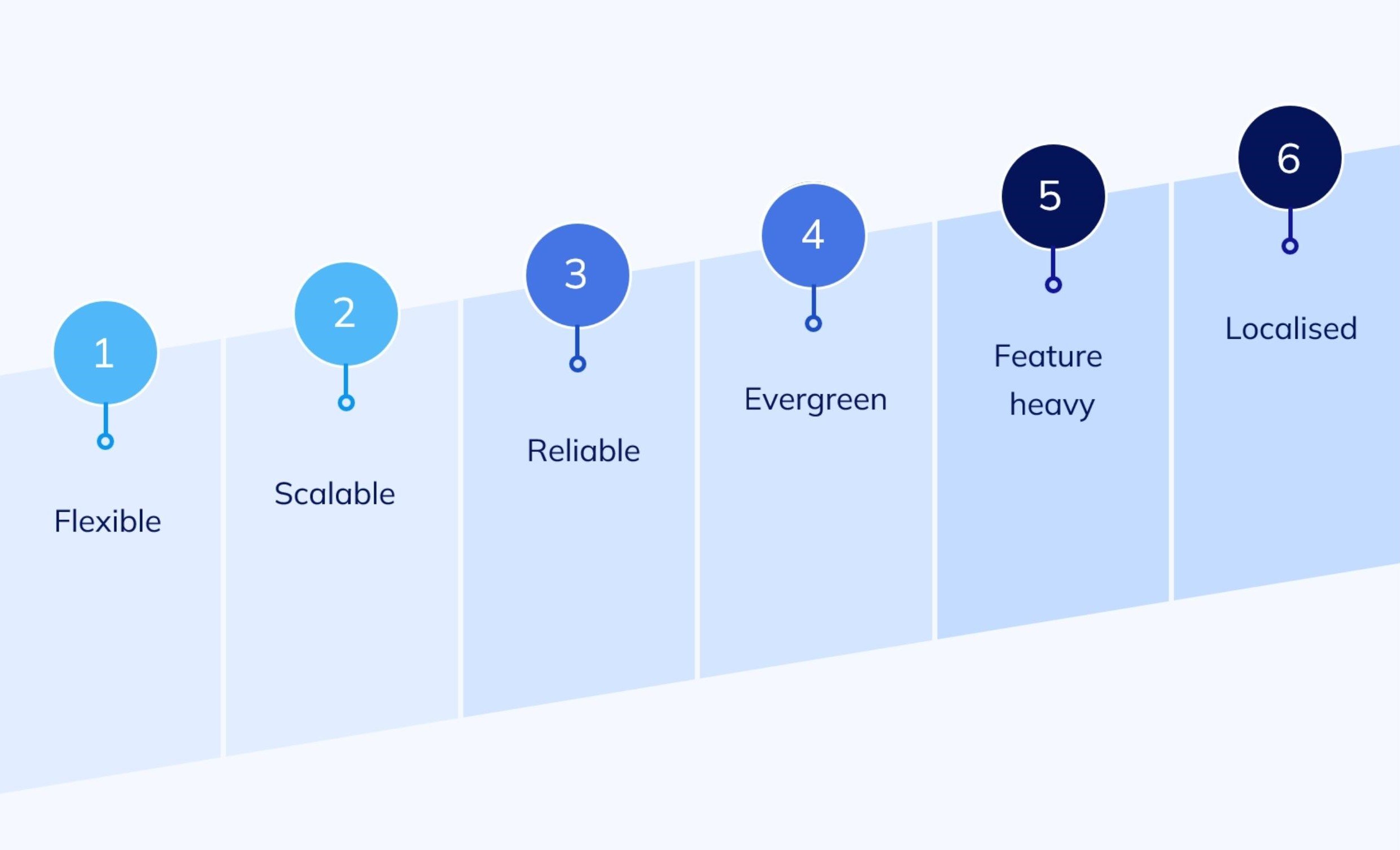Buying an ERP software is a major investment – perhaps the most important purchase your business will make.
But with almost 200 different ERP systems available in Australia alone, how do you know which ERP is right for your business? In this post, we'll cover:
- 3 types of ERP systems
- Which ERP is right for me?
- 6 must-haves for your new ERP system
- Need more help choosing an ERP?
3 types of ERP systems
ERP systems are often categorised by industry or business size, but there are really just three main categories of ERP, based on how the ERP system is hosted (or ‘deployed’).
-
On-premises ERP systems
On-premises (on-prem, for short) refers to an ERP system that is physically located and maintained in a designated space within your organisation (a ‘server room’). The setup involves hardware, including computers and servers, which you'll need to own and maintain. This is why on-prem ERP solutions are also referred to as server-based systems.
Pros of on-prem ERPs: On-prem ERP systems can customised more easily, which means the solution can be configured to suit the unique needs of your business.
Cons of on-prem-ERPs: Over time, on-prem ERP systems can become slow to run and may not always integrate easily with newer tools and technologies or third-party applications.
Choosing an on-prem ERP solution also means that your organisation must take full responsibility for securing both your IT infrastructure and data (especially given that a new cyber-crime is reported every seven minutesin Australia1). For businesses with limited IT know-how or in-house IT personnel, on-prem ERP solutions can end up becoming an expensive option..png?width=900&height=243&name=MicrosoftTeams-image%20(54).png)
- Hosted ERP systems
On the opposite end of the scale to an on-prem ERP system, some businesses choose to entirely outsource their ERP needs. Hosting providers can manage the deployment of the ERP software, as well as the associated IT infrastructure.Pros of hosted ERP systems: Fully outsourcing an ERP system often removes the upfront implementation costs of an ERP system as well as any ongoing maintenance and security costs. Because of this, hosted ERP systems tend to be popular for smaller businesses with limited IT resources.
Cons of hosted ERP systems: While you won't have the same capital outlay with a hosted solution as you would with an on-prem ERP, the sheer operating expenses of hosting an ERP solution can add up very quickly as your business scales and grows. Often, businesses with hosted ERP systems find that they eventually need to switch to a cloud ERP system. -
Cloud ERP systems
A cloud-based ERP is an ERP system minus the hardware. For this reason, cloud ERP systems tend to be the least hands-on option, in terms of maintenance, and involve far fewer upfront costs.
Think of ‘the cloud’ as a data centre that not only stores but also protects the data it houses. All you need is an internet connection and licences for your team members.
Also referred to as ‘browser-based’ or ‘web-based’ solutions, cloud ERPs let you log in and access real-time business data regardless of whether you are in the office or working offsite – as long as you have an internet connection.
Pros of cloud ERP systems: Many top IT analysts agree that the cloud is the best option for growing businesses, both in terms of cost, security and opportunity.
Cloud ERPs offer businesses all the control and flexibility of ownership, while passing over most of the risk, cost and complexity to the ERP software vendor. These include ongoing IT support, platform updates, new features and integrations, and security upgrades.
Not only are cloud ERP solutions a lot faster to implement in the first instance, but they also beat on-prem ERP solutions on their ability to analyse business data in real-time – giving cloud-based ERP businesses a competitive edge on insights and innovation. (Here are 7 reasons to switch to a cloud ERP).
Cons of cloud ERP systems: Despite the significant advantages of cloud ERP systems, there are still important considerations that businesses should be aware of before signing an ERP software contract. Long-term costs, integrations and vendor-lock in are just a few of the commonly overlooked challenges. Make sure you choose the right ERP software for your needs.

Which ERP is right for me?
Every business is unique. You may belong to the same industry or even sell a similar product or service, but your ERP requirements will be very different from the industry leader in your space—or your nearest competitor for that matter.
Ask yourself whether there is room for ownership and maintenance of IT infrastructure on your list of business priorities. If your business is growing quite rapidly and needs you to be fully focused on your current strategic goals, you're probably better off choosing a cloud ERP sold as Software as a Service, hosted in the cloud provided by the ERP vendor, and accessed through a web browser.

6 must-haves for your new ERP system
A good ERP system needs to have the following 6 characteristics to make your investment worthwhile:
- Flexible: Choose an ERP solution that not only integrates easily with your current tools but also with any applications you may want to add to your tech stack in the future. API is short for Application Programming Interfaces and allows cloud ERP systems to communicate with a host of third-party applications. The integrations page on an ERP vendor’s website is a good place to start.
- Scalable: Most modern cloud ERPs are subscription based, which gives you the freedom to add or remove licences depending on how your team grows or evolves with the times. Ask your ERP vendor what packages they offer.
- Reliable: Go with a well-recognised name that you can trust. On their website, look for social proof such as customer testimonials and awards or other recognitions. Look for ISO certifications, other accreditation or a Service Level Agreement. Find out where the company is headquartered and where its support team is based.
- Evergreen: When researching your next ERP provider, see how active they are on social media, find out what topics they blog about or when their last product update was. These are good ways to verify that you’re choosing an ERP vendor that has the resources to provide regular platform upgrades, new features, and security updates to ensure your business is powered by evergreen tech.
- Powerful capabilities: Not just strong accounting and inventory management capabilities, an ERP system should also offer powerful analytics and enterprise-grade security along with mobile features that enable anywhere-anytime work.
- Localised: Choose an ERP that’s been designed with local banking, tax and payroll requirements as this eliminates the need to use unintegrated standalone systems—saving your business both time and money. The more features an ERP vendor can provide out of the box, the easier it becomes for your business to plug and play—especially with software-as-a-service or SaaS-based cloud ERP solutions. Look for features like local bank feeds, chart of accounts, and Single Touch Payroll.

Have a question?
Have a specific question about how your business could benefit from moving to an ERP solution? Ask our friendly team today support@wiise.com or 1300 191 222.
Need more help choosing an ERP?
As cloud ERP solutions become the go-to choice for fast-growing businesses, keeping the above six factors in mind when selecting a cloud ERP system will ensure that your investment travels further while significantly accelerating time to value.
To find out more about how your business can benefit from an ERP, check out our previous blog posts:
- What is an ERP? Enterprise Resource Planning Explained
- How Will an ERP Meet My Business Needs?
- Is My Business Ready for an ERP?
To help kick start your internal discussions around your team's ERP requirements, download our handy ERP requirements checklist.
Alternatively, get in touch with one of our friendly Wiise team members to find out how Wiise ERP can meet and exceed your business needs.
1Australian Cyber Security Centre (2022), ACSC Annual Cyber Thread Report July 2021 to June 2022, https://www.cyber.gov.au
Ready to learn more?
Book a demo call with one of our friendly team members.

